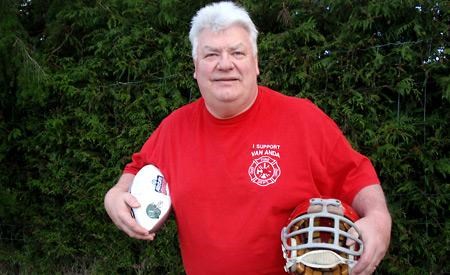For Warren Kiland, 62, of Texada Island, good sportsmanship is a way of life. Whether it’s professional athletics, corporate management or volunteering in the community, Kiland said “it’s all about the team.”
From an early age, Kiland knew he was good at sports, but football was where he really excelled. As a child, the Duncan-born youngster lived in mill towns throughout BC where his dad worked as a saw filer. When his dad died of polio in 1957, the family moved to Saskatchewan then after four years, settled back in BC in Maple Ridge where the local high school had a football team. The coach was so impressed with Kiland’s playing ability that he sent him to a BC Lions development camp at Empire Stadium in Vancouver, where scouts from colleges in the US and Canada attended to offer scholarships to new recruits.
With several offers in hand, Kiland chose to attend the University of Hawaii in Honolulu on a full football scholarship. He enrolled in oceanographic studies, a major program on campus and an area he continues to have a strong interest in. “It’s a profound learning experience understanding how the Earth is constantly changing, how tidal waves work, the relationship between the actions of the Earth’s crust and human habitation and how land masses constantly move and evolve,” Kiland said.
While studying in Hawaii, he played offensive tackle for the university’s Warriors and remained in that position when he was drafted by the Edmonton Eskimos in 1975. “Offensive tackle is the most exciting position to play. It’s where you get to advance the ball using strategy and teamwork,” Kiland explained. “A game was always more fun against a tough team because that added challenge to win was a growing experience for both the team and the athlete.”
He said he was very happy to return to Canada to both live and play football and he stayed with the Eskimos for three seasons. “In the Canadian game, the field is wider, the end zone is deeper and there’s more throwing and less running, which makes the game more exciting.” His pro career ended with a knee injury, but Kiland is still an avid fan, attending the Grey Cup most years and having season’s tickets to the BC Lions.
He returned to Vancouver and worked delivering materials by truck, soon learning to drive a ready-mix concrete truck. In 1991, he moved with his wife, Doriana Kiland, to Port Alberni, where her family lived, and progressed upward through the concrete industry. The family moved to Fernie, where Kiland became a concrete plant manager and he was appointed to the BC Ready Mix board of directors. At a board meeting he met a senior executive from Lafarge Canada, who offered Kiland a position as an area manager. “It was just in time as the Fernie plant was about to be sold.”
Kiland managed the Lafarge Canada ready mix plant in Brooks, Alberta and transferred to the Texada Quarrying Ltd. operation in 2011 as logistics manager. “We already knew and loved Texada and had visited many times to see members of Doriana’s family. We’ve always liked living in small communities where people pull together in times of adversity. It’s so important to contribute some volunteer service which helps everyone and makes you a better person.”
Kiland is a Texada representative on the Northern Sunshine Coast Ferry Advisory Committee, a director of the Texada branch of the Royal Canadian Legion and a trustee for the Gillies Bay Improvement District. He volunteers for Canada Day celebrations on the island. At Sandcastle Weekend, when Lafarge Canada offers quarry tours, he drives the van. He organizes and helps collect hazardous household goods for specialized recycling through the quarry’s vendors and organizes the annual Lafarge-sponsored Earth Day Battery Recycling Challenge in April, involving eight schools in the Powell River region. He also helps with disaster relief.
During the 2012 fire at Shelter Point Park, he donated the use of Lafarge’s 15,000-gallon tanker truck to bolster the island’s fire-fighting capability. When storms hit our area in December 2014, he organized sandbag deliveries to keep Texada’s health clinic from flooding and donated his own power generator to keep it open.
Elsewhere, he was a volunteer fire fighter for 14 years and high school football coach for a decade. “There’s a strong social value in young people playing sports,” he said. “They learn to respect others, to develop leadership skills, to work together as a team and to bring out that inner strength and fortitude to give it your all.
“Coaching, like most volunteer activities, is a way to give something back to the community you live in.”



